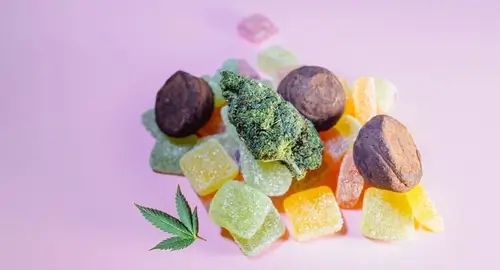Approximately 78 million Americans have confessed to having used marijuana at some point. With the legalization of cannabis in 23 states since 6th November 2012, the use of recreational marijuana has skyrocketed exponentially.
This has seen the creative use of cannabis. Those who can’t some it have resulted to infusing it into their foods, snacks, or drinks. This increased popularity of cannabis edibles has many wondering about the long-term effects of consuming THC in this format.
Unlike smoking, where you feel the effects almost immediately, edibles can take 30 minutes to 2 hours to kick in. This delayed reaction often makes people eat too much, thinking they need more. When the effects finally hit, it can be an intense high that lasts for hours.
This prolonged high means edibles may impact your sleep, coordination, and cognition for much of the day. Frequent or high-dose edible use over a long period could lead to greater memory impairment, learning, and decision-making.

Why Do Edible Marijuana Products Effects Last Longer?
When you eat cannabis edibles, the THC has to take quite the journey before you feel the effects. Unlike smoking, the THC in edibles first travels to your stomach, then to your liver, where it’s metabolized into a more potent form of THC called 11-hydroxy-THC.
From there, it finally makes its way to your bloodstream and brain. This long process is why edible highs last 6-8 hours compared to the 2-3 hours from smoking.
The potency and duration of edible cannabis effects have much to do with your body’s metabolism and how quickly your liver processes the THC. For some, edibles can take 30 minutes to kick in, while for others, it may take 2-4 hours to feel the full impact.
The problem is, without knowing exactly how your body will react, it’s easy to make the mistake of consuming too much THC by eating more edibles before the initial effects. This can lead to an uncomfortably strong high anxiety, paranoia, and impaired motor and cognitive functions.

Do Edibles Make You Age Faster?
Some research shows THC, the main psychoactive compound in cannabis, may speed up the aging process in some ways. Studies on long-term cannabis users suggest THC could potentially:
- Accelerate age-related declines in cognitive abilities like learning, memory, decision-making, and problem-solving. While cannabis may temporarily impair these functions when high, long-term use could lead to more permanent damage.
- Speed up cell aging. THC may cause changes in cells and DNA that make cells appear older than they are. This could potentially impact how fast your body and brain age over time.
- Exacerbate age-related mental health issues. Long-term cannabis use is linked to higher risks of anxiety, depression, and psychosis, especially for older adults. As people age, they become more vulnerable to these mental health problems, and cannabis could intensify them.
However, the research is mixed and ongoing. Some studies have found little to no link between cannabis use and aging or age-related health issues. Many factors are at play, and more research is needed to fully understand the long-term effects of THC and how it interacts with the aging process.
Seeing that the research on cannabis and aging is ongoing, the question, “Do edibles make you age faster?” will have to wait to be answered with an affirmative or no. For now, a “Maybe” will have to do.
Read more: Does Smoking Weed Cause Acne? Yes & No

Effects of Long-Term Edibles Use on the Brain
Long-term edibles use may significantly affect your brain health and cognition. While edibles in moderation likely pose little risk, frequent or heavy use over many years could impact your memory, focus, and mental processing speed.
Memory Loss
Chronic edibles use has been linked to problems with short-term memory, especially recalling recent events. This could make remembering appointments, tasks, or conversation details harder. The good news is these memory issues seem reversible after stopping long-term use or reducing intake.
Difficulty Concentrating
When you consume edibles regularly for a long time, it may get increasingly difficult to focus your attention or think clearly. You might find yourself easily distracted or struggling to complete complex mental tasks that once came more easily. Like memory problems, issues with concentration and focus often improve once long-term use is discontinued.
Slower Thinking
Processing information and responding may take longer when you have a lengthy history of edible use. Studies show long-term consumers tend to perform worse on tests of executive function, processing speed, and decision-making.
Your reflexes and reaction times could also be dulled. Slowing these cognitive functions is usually temporary, but reversing the effects may take weeks or months of abstinence or moderation.
Some edible effects may last longer and be more intense, but using them occasionally and responsibly is unlikely to impact how you age over the long run drastically. The research is mixed, and people’s experiences vary. The biggest impacts on aging are the lifestyle factors you can influence-things, like diet, exercise, sleep, and stress management.
Read more: How To Recover From Edibles: A Quick Roadmap
Find Help For Yourself or Your Loved One at Launch Centers
If you or a loved one are experiencing challenges related to edibles use or have concerns about cognitive function, it may be beneficial to seek professional guidance. Professionals at Launch Centers are dedicated to providing holistic, trauma-informed support for individuals struggling with addiction or mental health issues. Our caring team can provide guidance, resources, and community support to help you on your journey toward hope, healing, and recovery.
Remember, your well-being and cognitive health are important; seeking help is a sign of strength. Embracing a balanced approach to edible use and taking proactive steps to support your overall well-being can contribute to a fulfilling and vibrant life. Call Launch Centers today at (877) 895-3231 to speak with our admissions team and start your journey to hope, healing, and recovery.





